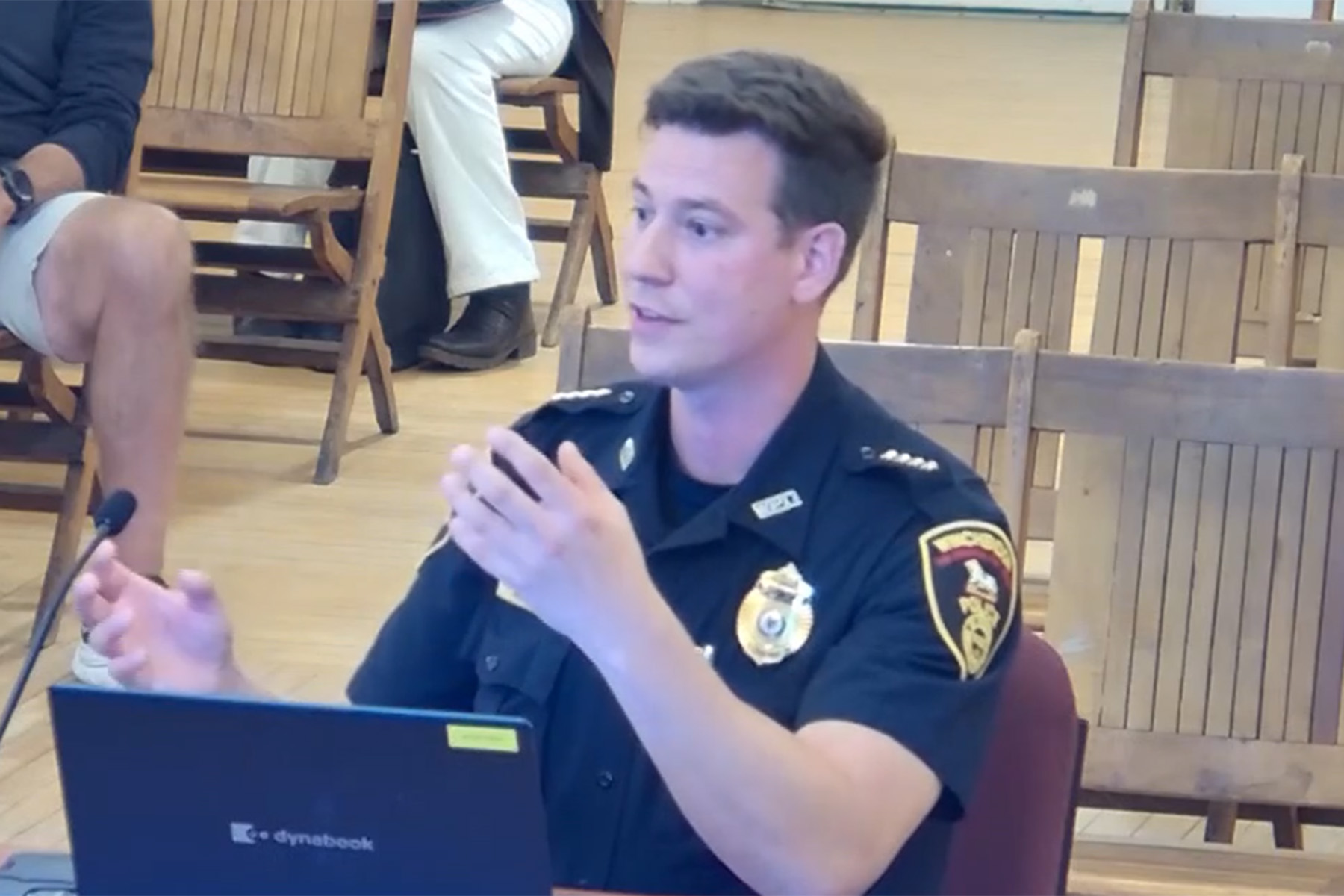
Saturday, September 27 ~ 12:00 - 8:00 p.m.
Central Mass
Irish Festival
Irish roots in the heart of New England.
This fall, the best in Irish entertainment comes to The Robinson Broadhurst Foundation Performing Arts Amphitheater for the first annual Central Mass. Irish Festival.
Three of New England's premiere Irish bands, dancers, harps, pipes and drums, Irish food and drink, Irish vendors, and an open trad seisun come together for an all day celebration of all things Irish at a brand new lakeside amphitheatre.
More info: https://www.centralmassirishfestival.com/
Tickets $20 per person, available at https://www.eventeny.com/events/central-mass-irish-festival-2025-19621/
At Winchendon Community Park
86 Ingleside Drive
Sponsored by Winchendon Parks & Recreation.
This Week's Winchendon News
Police Chief Wolski Gives BOS a Presentation on the State of The Police Department

Police Chief Dan Wolski addresses the Board of Selectmen
Photo copyright Town of Winchendon

Chief Wolski shared this photo he took of the police station after a storm
Photo copyright Town of Winchendon
At the Board of Selectmen's meeting on Monday, September 22, Winchendon Chief of Police Dan Wolski presented an overview of the Winchendon Police Department. Board Chair Andrew Beauvais explained, "the Board has decided that it's beneficial to have our Department heads and/or committees come before us on a regular basis, just so we can keep everybody informed and so we're all on the same page." He thanked Chief Wolski for being the first Department head to appear. The Communications Committee appeared before the Board on Monday, September 8.
Chief Wolski began with the basic staffing of the department. "We have sixteen full time police officers, nine patrolmen, one school resource officer, three sergeants, a lieutenant, one detective and myself," he said. "We currently have no reserve officers, no police part-time police officer," he went on, adding that in the past, the department did have reserve officers.
The Winchendon Regional Communication Center is a regional dispatch center that provides dispatch services not only for the town of Winchendon, but also for the town of Royalston, which includes dispatching police, fire and DPW for both of those towns. "We also receive the 911 calls." he said. "So if you call 911, whether it be from your house phone or from a cell phone, if you're within the confines of Winchendon or Royalston, that's going to be directed right to our dispatch, our PSAP (Public Safety Answer Point)."
Including all types of calls--regular telephone calls, 911 calls, business line, emergency line--the Winchendon Regional Communication Center receives more than 15,000 calls a year (an average of more than 40 per day). "We have five full time dispatchers, one permanent part time, and four per diem dispatchers. Sometimes those numbers ebb and flow for various reasons, but by and large, that's our staffing in that center. So it's really a relatively small team of people that are doing a lot of work," Chief Wolski said.
Lastly, he added, "we also are regional animal control. Wincheon and Templeton regionalized. We employ the staff, which consists of three part-time animal control officers. They're also on call for emergencies, and that schedule rotates, and they answer any call relative to an animal control situation in both the town or the town of Templeton."
Board member Audrey LaBrie asked how many law enforcement officers were recommended for a town of Winchendon's size (about 11,000 people). "I'm glad you asked," Chief Wolski said. "So the FBI did a study a number of years ago, and they said that per thousand residents, a town should have approximately 2.1 police officers. So if you just do the quick math, that would be over 20 police officers [for Winchendon]. I have a realistic perspective. We're a relatively busy Police Department, and we have a relatively large population compared to the relative size of the police department, so thank you for drawing that to everyone's attention."
Chief Wolski explained that the Department actively supports Community Policing Initiatives. "There's a group of us, different organizations and agencies within the community, we've collaborated. Currently, we're having some issues with homelessness in the community, so opposed to that just simply being the police department's responsibility to try to improve that situation, We all partner, we collaborate, we try to come up with creative ideas, to come up with solutions for problems that affect all of our community."
One initiation is the Community Partnership Breakfast that's held at the Senior Center every other month. "I try to attend the majority of those meetings," Chief Wolski said. "That's again, a collective group where we discuss issues that are confronting the town, and we kind of spit ball, how can we collaborate together to try to tackle this problem?"
The Post-Overdose Support Team works with GAAMHA in Gardner. "They send out a social worker, and they team up with a Winchendon police officer. We visit the homes of those that suffered a drug overdose, and we inform them of the various resources that exist. If they're interested, the social worker from GAAMHA can connect them to those resources."
The School Resource Officer Program, places Officer Tracy Flagg in the schools. The program expands the role of police into being more than just crime fighters and law enforcement, to where we're now engaged in the school, we're engaged with parents at the school, we're engaged with the students."
The Rape Aggression Defense Program (RAD) is run by Officer Flagg accompanied with a couple of other Winchendon officers.
Officer Derek Blair is a member of the Domestic Violence Task Force that's a collaboration with the District Attorney's office, Chief Wolski said. "If any very high profile domestic violence incidents occur in town, he reports those to this task force and is in collaboration with them and in communication with them to try to assist the victim through that situation."
The Internet Scam Awareness/Prevention program runs classes in various internet scams at the Senior Center and senior housing in town like Hyde Park and Ipswich Drive. Seniors tend to be more susceptible to internet scams, Chief Wolski said. "Hopefully we can prevent people from having to come to the station say, 'Hey, I was on the internet and I got scammed.' If they can take away some education, maybe it'll prevent that from happening in the first place."
The newest initiative is the Child Passenger Safety Program. Funded by a grant, this enables the department to purchase child car seats that can be provided to low income families. The department can coordinate with other organizations and agencies in town, including the Housing Authority, CAC and school department, to let them know this resource is available.
Ms. LaBrie said that it would be great if Officer Flagg could share information about issues and concerns she identifies in the schools which the Board might be able to assist with.
Moving on to Special Programs, Chief Wolski talked about K-9 Blitz, the department's current K-9 officer. Blitz is a four-year-old Belgian Malinois and has been with the department for two years. "He's what's considered a utility dog," Chief Wolski said. "So he doesn't just have one skill set. He's received an extensive amount of training, and he's actually certified by the state in Search and Rescue, Criminal Apprehension, Evidence Recovery and Narcotics Detection." Chief Wolski added a follow-up to the recent medical emergency Blitz experienced. After treatment as several emergency veterinary hospitals, Blitz has made a full recovery. He experienced breathing problems which may be related to a problem with his throat, and he may undergo surgery to correct this.
The Worcester County Drug Task Force is part of what Chief Wolski described as the department's "multi-faceted approach" to drug-related problems. "You can have compassion for individuals who are suffering from substance abuse, but there's a lot of consequences that surround it and whenever you have any drug use, you're going to have inherent quality of life issues that impact the community," he said. "You need to have aggressive investigation and prosecution of particularly drug dealers that are dealing this poison on the streets of our communities."
Detective Caleb Similia works with the WCDTF and has executed several search warrants around town of residences and of individuals who are dealing with narcotics in the community. These investigations and search warrants have led to several arrests, Chief Wolski said. The department has applied for a grant through the Byrne Justice Assistance Grant Program which will allow the department to assemble a team of three officers that could be paid overtime for additional hours dedicated exclusively to drug-related enforcement.
Board member Tiffany Newton asked whether the grant could be used to hire more part-time officers rather than loading up overtime hours on the existing officers. Chief Wolski explained that the grant does not allow departments to actually hire new officers. Hiring new staff is more costly, time-consuming and complicated than it sounds.
Chief Wolski went on to say that this was not the kind of extra assignment that contributed to burnout. Often routine police work can be "monotonous" and there are officers in the department who are eager to work in the area of drug enforcement. "Contrary to being burned out, this is going to really give some vigor in folks, that this is going to give them an opportunity to work on something that they otherwise may not have the opportunity to do, and give them a status that they may not otherwise have, where now they're not just patrolling, but they're part of this task force," he said.
Moving on to Important Training, Chief Wolski said, "I don't want to be too morose in talking about it, but I honestly think that probably the most important thing I can be doing right now, as the town's police chief, is focusing my attention on making officers of the Winchendon Police Department are well trained to respond to an active shooter situation. Unfortunately, when you turn on the news, you're seeing it's all too common. I have children that are school age, and it's a large concern for everyone. Hopefully, officers never have to utilize the training, but they certainly need to have it."
Officer Flagg, assisted by other officers, has been running the ALICE training, "the preeminent training in schools across the country," in the Winchendon schools a couple of times a year. In addition, Chief Wolski said, "the State Police will put on the training, and there is a cost to it, but they come out and they put on a very elaborate training. It's usually during the summer when there's nobody at the school, and it's a very elaborate training where the officers and members of the fire department, we can go into the school, we actually have like paintball, essentially, where we're actually shooting and stuff like that," simulating a "live" shooter event. "I want the townspeople to take some comfort in knowing that we do this training, and we're going to try to do it more, particularly the training with the State Police, because it's very realistic," he said.
Related to this, Chief Smith said that the department needs additional rifles and body armor. The rifles can be considered an essential part of a police cruiser, as much as the radio. "In 2025 every one of those cruisers needs a rifle on it also, so that God forbid, if we ever had to, we could appropriately respond." By body armor, Chief Wolski says he means "something in addition to the regular bulletproof vest. You would don that in a situation where you're going into an active shooter situation. So in my opinion, it's essential."
Three additional rifles would be $6,000 to $8,000, Chief Wolski said. There were possible sources for grant funding that could be discussed with the Town Manager.
Moving to Challenges, Chief Wolski spoke at some length about how quickly technology becomes outdated and obsolete. One example is the officers' body cameras, which were first purchased in 2022. Three years later, the manufacturer, Motorola, is already saying these cameras are at their end of life. If hardware is updated, departments can find that the associated software to run it no longer works with the new hardware. As police departments, like everything else, become more and more dependent on technology, these issues become huge cost drivers for their budgets. Once purchased, they can lock in the department and make changing difficult. Another simple example Chief Wolski offered was the electronic key fobs for getting in and out of the police station. Technology can also bring a whole new package of inherent costs. For example, citizens can now request body cam videos under the Freedom of Information Act, but by law any such videos must be edited to remove or obscure certain information. That takes time and requires someone to be paid to go through the video and edit it.
"I was running up against a similar situation with our tasers," Chief Wolski said. "The company manufacturers said that they were at end of life and that they were no longer going to support them. And again, it was an issue with operating software, and that technology is very sophisticated, and so it's very expensive, and we did not have the money in our operating budget to replace them. I did an application with Robinson Broadhurst, and they were very generous to award a grant that is going to cover the cost to get brand new tasers for the entire police department."
The next challenge was Police Staffing. "I have five officers who are going to be retiring over the next three years. So certainly presents a challenge," Chief Wolski said. "The police reform bill in 2020 effectively eliminated part time officers in Massachusetts because it requires that all police officers go to a full time Academy. The problem is, if somebody's full time Academy trained, there's no incentive for them to stay as a part time officer." He went on, "But I would like to have a conversation with the Town Manager. I would like to start preparing now. I know that two people are going to retire next summer. We might be able to, if perhaps somebody is in college right now, we might be able to hire somebody on a part time basis if they're guaranteed that they're going to get a full time job...it might save us money and make for a much smoother transition, opposed to waiting until these folks retire, and then I'm going to be short staffed, and then you're certainly going to run into, potentially burnout and an excess of overtime."
Building Maintenance for the police station presents a couple of challenges: the HVAC system and the brick masonry on the exterior. The building itself is over 100 years old, Chief Smith said. The HVAC system in the building was in use during the 1990s when that building was a courthouse. In much of the building, it doesn't work, and the department has installed window air conditioning units. The old system also uses R22 coolant gas that the EPA is now phasing out.
The brick masonry on the exterior of the building needs repointing, which involves replacing the mortar between the bricks. Former Police Chief Dave Walsh was trying to get the repointing done and got quotes for the work, but it didn't happen.
Chief Wolski concluded his presentation with, "We are a relatively small police force given the size of the town. The town has some financial constraints, which creates a greater burden. However, with all that said, we have a fantastic police department here in Winchendon, thanks to the members on it. The people that are working on the department, the patrolmen, sergeants, the detective and so we're always striving to improve our performance. We're constantly striving. But I think we should celebrate the fact that we fulfill the department's mission. We can always find areas to improve right now with the police department that we have, but we meet this mission and we do positively impact the lives of those that we serve."
Ms. Newton asked whether the department could get a Green Communities grant for the HVAC system.
"Green Communities would not allow us to apply for the grant until we had a weatherization done first," Chief Wolski said. "Weatherization is insulation improved and having different portions of the windows improved in terms of weather stripping and things like that. So we applied for a grant through Green Communities just to have that weatherization done. I think I'm correct in saying that it was granted for several buildings in town, including the school, the library, the police station, so that work has been completed. So now with that, I think that's basically the first step...I don't know where we stand on that in terms of Green Communities, but it's certainly something we would consider before we would go to the taxpayers."
Asked about the brick repointing, Chief Wolski said that Chief Walsh had been planning to have one wall of the building done at a time, which was quoted for something like $10,000 at that time. It would be possible to get a new quote.
After Chief Wolski concluded, David Connor, director of Winchendon Templeton Housing Authority, came forward to say, "The Housing Authority has a lot of brick buildings, brick veneer, not solid brick like your building is, but we've partnered with Monty Tech and their masonry department, and over the last few years, their 10th, 11th and 12th grade students have come out, usually a couple of times a month, for a week at a time, and worked on our buildings at Pearl Drive. They're already on building number 4, working their way around the development. So as a thought is looking forward, is possibly trying to partner with them, and they could come out and do an assessment and maybe see because they were telling me that these are the projects that they're looking to train the kids on, the repair work."
Mr. Beauvais said to Chief Wolski, "I just want to say thank you for being our first guinea pig. That was a beautiful presentation. I can tell you put a lot of heart and soul into it. To you and the rest of the officers, we sincerely thank you for everything you guys do for this community. I appreciate the fact that you're proactive. You find ways to save the town money while still giving your best. So I appreciate that. Thank you."
BOS Discuss Fall Town Meeting to Present Fire Station Project to Voters
At their meeting on Monday, September 22, the Board of Selectmen discussed dates and time for a Fall Special Town Meeting to place the $14.4 million fire station project before voters. Board Chair Andrew Beauvais suggested Monday, December 1 for the Town Meeting, saying, "I think we were targeting the first week of December to allow for at least one holiday to pass." The warrant would also include proposed revisions to the Town Charter which the Charter/Bylaw Review Committee has been working on for some time. Town Manager Bill McKinney confirmed that December 1 allows sufficient lead time to schedule the Town Meeting.
Board member Tiffany Newton, who is also a member of the Capital Planning Committee, said that the fire station project is slated to come before the Capital Planning Committee at their October meeting, on October 22.
Board member Audrey LaBrie said, "I have to express that's a whole month away, one of the hottest issues to come down, or the hottest issue since the override. There are two items on your agenda for Wednesday night, one of which is the request by the Police Chief. The other is a capital request by the Senior Center Director, which, not knowing what those items or requests are, I'm sure are nowhere near what this fire station project is. So I will express my concern that the Capital Planning Committee will not get this for another month. I think we're losing time."
Mr. Beauvais said that they weren't voting on a motion, they were just looking for a target date and deciding whether to indeed hold a Special Town Meeting. Board member Melissa Blanchard said that many residents are out of town in the winter months.
Asking Fire Chief Tom Smith if he wanted to comment on the date, Mr. Beauvais said, "The primary reason is simply to allow enough time for you to be able to hold open houses and info sessions allow folks to ask questions so that they can be informed, and then ultimately, we give the residents their voice and the ability to choose whether or not they want this to happen."
"Correct," Chief Smith said. "As far as the date goes...We did ask around as far as when and a majority of the people that I spoke to, as far as when they left to go south, a lot of people...went after the Thanksgiving session and after that towards Christmas. So that first week of December certainly would fall into--people are still here."
He went on, "As far as the number of presentations in that, we've got potentially a schedule of, I think there was almost ten different informational sessions to get the information out there. It wasn't on this Capital Planning coming up, but it would be the next one...before that we would have open house sessions. We would have informational sessions, both online and in person, so that if there were residents that could not attend an in person session to get the information out. And it's information both ways. It's not information necessarily 'they have to vote for the project.' It's information, so they're making an informed decision. It's not my decision whether they vote yes for a project."
The Board discussed the costs of holding a Special Town Meeting, which is about $3,000. The question will also need to go to a ballot vote if it passes at Town Meeting. It will require a two-thirds majority to pass at Town Meeting and a simple majority at the ballot vote. The election for the ballot vote costs about $11,000 hold.
The Board agreed to finalize the date of the Special Town Meeting at their next regular meeting.


